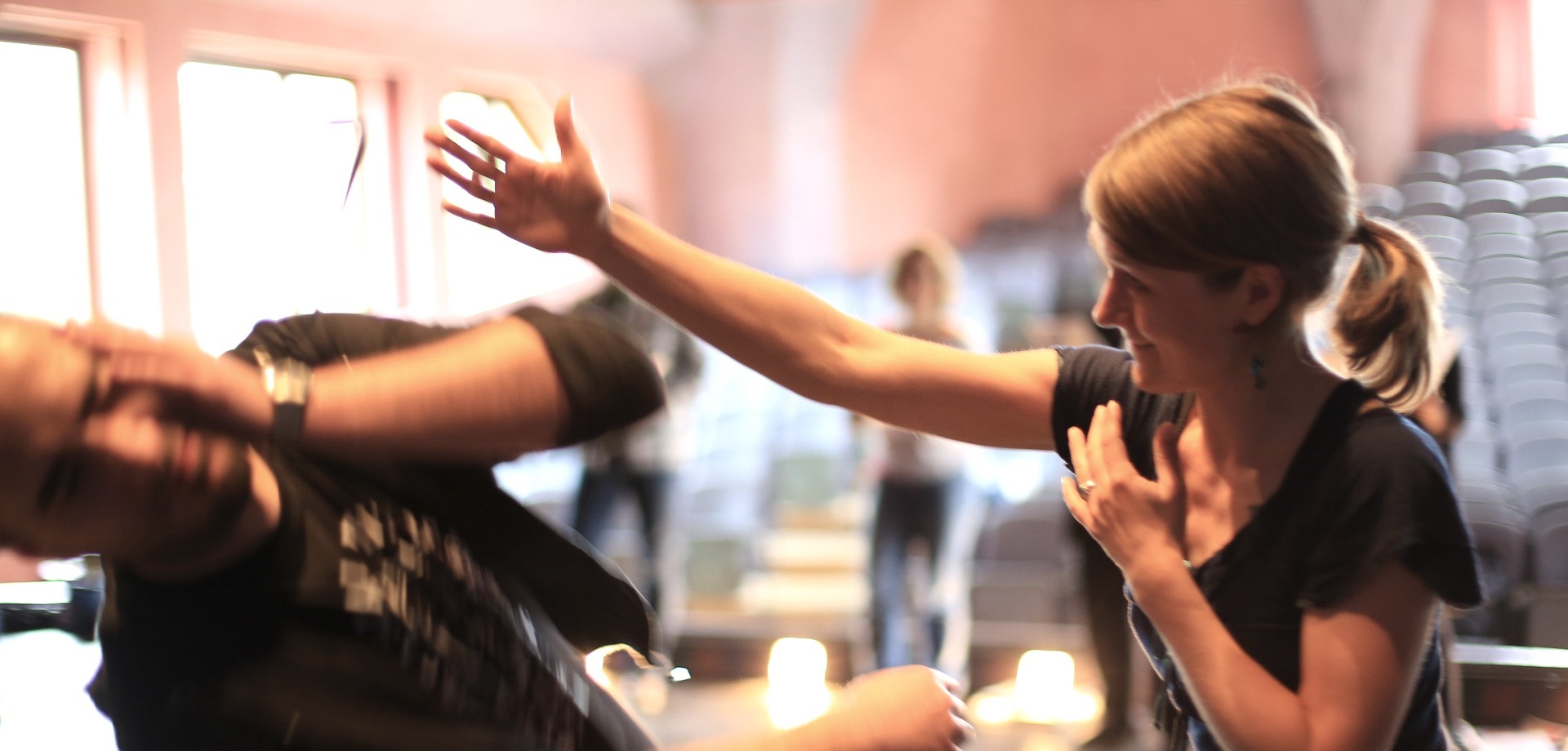
Aims of the year
The whole year aims to give participants an experience of the deep breadth and the broad depth of the world of story and story-telling, and of all its different facets. At the end of the year, participants will be able to differentiate between different styles and forms of stories, and apply the appropriate techniques when preparing to tell any story.
In the following years, participants will have the opportunity to deepen their story-telling skills.
Exercises
The basic tools for movement and acting training developed by Michael Chekhov to strengthen the nascent artist within, and the speech exercises given by Rudolf and Marie Steiner, to make conscious and then shape the whole of the performer’s speech instrument, make up approximately half of the work of each module and are practised daily.
Individual Modules
Each module introduces new exercises in movement and speech as well as a new aspect of the epic style of performance.
The individual tuition and practice between modules aims to deepen and strengthen participants’ grasp of the material newly introduced.

Module 1 - The Greeks
This module addresses the origins of storytelling, focussing on the monumental events in the stories of Homer, the Iliad and the Odyssey, in translation both in the verse form of hexameters and in prose; it also includes Greek myths and legends and Aesop’s fables.
Subsidiary subject: singing and music
A selection of suggested background material:
Homer - The Iliad
Homer - The Odyssey
Aesop - Fables
Robert Graves - The Greek Myths
Virgil - The Aeniad
Between Modules 1 - 2
Individual tuition: 4/30 hrs

Module 2 - Folk & Fairy Tales
Other forms of stories, again from the beginnings of the oral tradition of story-telling, are examined in the second module. The European fairy tales collected by the Grimm brothers in Germany are at its heart; fairy and folk tales from other cultures, such as the Celtic tradition, are also explored.
Subsidiary subject: sculpture
A Selection of Suggested Background Material
The Grimm Brothers - Folk and Fairy Tales
Ella Young - Celtic Wonder Tales
Alexander Afanasyev - Russian Fairy Tales
Sioned Davies - The Mabinogian
Roger Lancelyn Green - Arthurian Legends
Hans Christian Anderson - Fairy Tales
Rudolf Meyer - The Wisdom of Fairy Tales
Between Modules 2-3
Individual tuition: 4/30

Module 3 - Dramatising Stories
The work of the third module focuses on embodying the language, the images and the characters central to a single story, so that the original words of the story become the foundation for and lead to the creation of a dramatic performance.
Subsidiary subjects: gymnastics
A Selection of Suggested Background Material
Michael Chekhov On the Technique of Acting
Paul Sills Story Theater
Doug Stevenson Story Theater Method
Between Modules 3-4
Individual tuition: 10/30 hrs

Module 4 - Ballads and Epic Poetry
Continuing the work of the first two modules, epic poetry and ballads and the poetic forms and metrical structures they employ become the subject of study.
Subsidiary subject: eurythmy; poetics
A selection of suggested background material:
Thomas Percy - Reliques of Ancient English Poetry
Geoffrey Grigson (ed.) The Penguin Book of Ballads
Arthur Quiller-Couch (ed.)The Oxford Book of Ballads
H.W. Longfellow - Hiawatha / Evangeline
Charles Kingsley - Andromeda
Alfred, Lord Tennyson - The Idylls of the King
J.R.R. Tolkien - The Fall of Arthur / Beowulf
Coleridge - The Rime of the Ancient Mariner
Between Module 4-5
Individual tuition: 12/30 hrs

Module 5 - Performance
As in the first year, the final module is devoted to creating a performance from the material that has been explored and brought to a certain maturity for presentation in the course of the year, both in the five modules and then in individual tuition.
Subsidiary subject: singing and music
Subsidiary Subjects
Those subjects introduced in the first year - music and singing, eurythmy, sculpture and gymnastics – continue. The new field of poetics has been included in the repertoire. Each module includes one subsidiary subject, which by its nature is close to the content of the module.
Individual Tuition
The individual tuition now takes place with one of several teachers (please see faculty page) at regular intervals between the modules. This tuition gives participants the opportunity to become more familiar with the work begun in the modules, both on speech exercises and on the different stories.
Participants are required to take initiative themselves to contact the tutor to set up times for individual tuition.
Individual Practice
Participants are asked to commit to practising movement and speech, exercises and texts, between 30 and 60 minutes per day, five days per week, independent of any tuition.
Anthroposophical Study
Regular study both of the background to the practical work in the field of speech and drama - this includes understanding the nature and constitution of the human being - has now become a core element in the training programme. Participants are asked to include this in their individual work outside the modules.
From the second year onwards, participants are given the opportunity to work towards acquiring a Goetheanum diploma. One of the criteria for being awarded such a diploma is that students demonstrate that they have regularly given time to anthroposophical study, both individually and in a group.
The initial material for study is Anthroposophy: A Fragment, by Rudolf Steiner, written in 1910. It is published by Steiner Books in 1996.
Performances
Whenever possible and whenever appropriate, each of the modules includes a visit to a performance on one of the evenings. The intention is to attend performances that have some kind of connection with the content of the relevant module; this can help in the development of each performer’s individual aesthetics, an important aspect of any training in the performing arts.
Please note: the contents of The Epic Year are subject to alteration!
Location
Accommodation with self-catering facilities is available at the Peredur Centre fot The Arts, East Grinstead, East Sussex.

Cost and Application
The cost of the course is £2650
A pre-requisite of this course is successful completion of year one.


